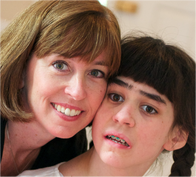
When Shannon was 10, our support group asked me to help create a database of parent-reported information about the condition to help researchers studying this condition. I had no interest in research because I didn’t think it would help her in her lifetime. But they wouldn't let it go.
I’m now the principal investigator of the Phelan-McDermid Syndrome International Registry, and I see the power of research every day. We collect information about the real-world health, care and life experiences of individuals who have this condition. This information is empowering researchers, parents and caregivers to address issues fundamental to a child’s quality of life.
Shannon, for example, does not feel pain the way most kids do and she cannot communicate pain verbally. The experiences of parents, caregivers and other children who share her condition have helped us educate doctors and school staff about the medical risks she faces and the care and supervision she needs.
Our work received a tremendous boost when the Patient-Centered Outcomes Research Institute (PCORI) was created under the Affordable Care Act. For a small parent-led foundation like ours, it was a dream come true.
PCORI is a non-profit organization, independent from the federal government. That’s important, because it ensures patients, caregivers, doctors, nurses, insurers, employers and researchers – all working together – have the final say on what gets studied. This is not research for the sake of building careers and publications. Instead, it is research to improve patients’ lives now, and it is crucial for the health of all American’s that PCORI continues to be supported.
Every day, patients face difficult decisions about which health-care approach will work best for their individual situation. PCORI funds research that answers those questions, which haven’t been addressed well by traditional research. We know certain medications can lower your blood pressure, control your diabetes or help your depression. But we don’t have much evidence about how these treatments affect different people or how they impact our quality of life.
That’s a real problem. If treatments have too many or unexpected side effects, patients can lose their ability to function normally. As the mother of a child with a rare disease, the stakes are higher. Very little information exists about the care options available to us or how our children will respond to treatments for common problems that were designed for the general population. There are many children with Phelan-McDermid syndrome that have been treated with more than a dozen anti-seizure medications and none of them control their seizures. This becomes a life and death issue.
To fill these information gaps, PCORI has invested more than $1.2 billion in studies comparing different approaches to diagnosing, preventing and treating a range of conditions and diseases that impose a heavy burden on individuals, their families, and the health care system as a whole. Every year insurers pay for treatments that don’t work, then they pay for more treatments that don’t work. The entire health care system would benefit if the appropriate treatment was prescribed and paid for from the beginning.
Our national policy makers want to empower individuals and families to choose the health care that best suits their needs. However, we can’t choose wisely if we don’t have useful information. If my daughter’s physicians, who have the benefit of years of medical training, don’t know what to prescribe for her, how am I supposed to make effective health care decisions? Thankfully, PCORI is engaging caregivers like me and patients like my daughter Shannon in the process of studying the questions that matter to us. Its work is critical to building a genuine patient-centered health care system.
